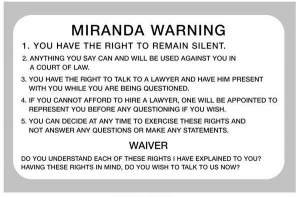The Fifth Amendment to the United States Constitution gives you the right to remain silent and not speak to law enforcement. In Ohio, you must give your name, birthday and address if they have legitimate grounds you have committed a crime. You do not have to say anything else but that you want to call a criminal defense attorney.
To secure a conviction, law enforcement will often use what you say against you in court. They are trained to ask just the right questions, to get what they need you to say. Too many people end up speaking to police upon an arrest about the incident which makes the situation worse.
As a criminal defense attorney, this is the best advice in this situation
- Don’t get into an argument with or lie to the police.
- Keep your hands where the police can see them.
- Think carefully about your words, movement, body language, and emotions.
- Don’t run. Don’t touch any police officer. Don’t resist even if you believe you are innocent.
- Don’t complain about the scene, tell the police they are wrong or that you are going to file a complaint or lawsuit.
- Do not make any statements regarding the incident.
- In order to preserve your right to remain silent, you must clearly tell the police officer that you are invoking your right to remain silent and then be silent.
- Write down everything you remember ASAP. Remember officers’ badge and patrol car numbers. Try to find wit- nesses and their names, addresses, and phone numbers.
- If you are injured, take photographs of the injuries as soon as possible, but make sure you seek medical attention first.
- What you say to the police is always important. What you say can be used against you, and it can give the police an excuse to arrest you and search you and your car especially if you bad-mouth a police officer.
- You don’t have to answer any questions asked by the police. However, you are required to provide your name, address, and date of birth upon request. You can be arrested in Ohio for refusing to provide this information.
- You should never consent to any search of yourself, your car, your cell phone or your house. If you DO consent to a search, it can affect your rights later in court. If the police say they have a search warrant, ASK TO SEE IT.
- Do not interfere with or obstruct the police–you can be arrested if you do.
The Bottom Line: You are most likely being recorded from the minute you are stopped until you are released and it will be used in court. It’s natural instinct to try and talk your way out of the situation, but instead, end up incriminating yourself. Remain silent and know that as a criminal defense attorney in Ohio, I am prepared to aggressively defend you and fight effectively for your rights.
Call me: 513-260-2099


Leave A Comment